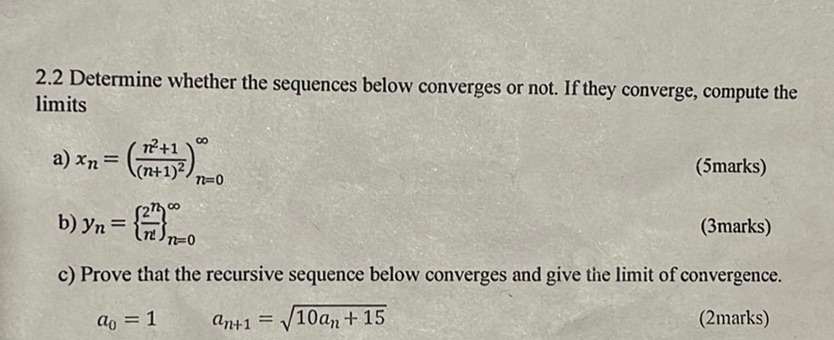Published
- 2 min read

Question: 2.2 Determine whether the sequences below converges or not. If they converge, compute the limits a)…
2.2 Determine whether the sequences below converges or not. If they converge, compute the limits a) x_n = (\frac{n^2 + 1}{(n + 1)^2})^{\infty}{n=0} (5marks) b) y_n = (\frac{2^n}{n})^{\infty}{n=0} (3marks) c) Prove that the recursive sequence below converges and give the limit of convergence. a_0 = 1, a_{n+1} = \sqrt{10a_n + 15} (2marks)
Solution
To solve these problems, we will determine whether each sequence converges and find the limit if it does.
a) Sequence \( x_n = \left(\frac{n^2 + 1}{(n+1)^2}\right)_{n=0}^{\infty} \)
First, take the limit as \( n \to \infty \).
\[ x_n = \frac{n^2 + 1}{(n+1)^2} \]
Divide the numerator and the denominator by \( n^2 \).
\[ = \frac{1 + \frac{1}{n^2}}{\left(1 + \frac{1}{n}\right)^2} \]
As \( n \to \infty \), \( \frac{1}{n} \to 0 \) and \( \frac{1}{n^2} \to 0 \).
\[ \lim_{n \to \infty} x_n = \frac{1 + 0}{(1 + 0)^2} = 1 \]
Therefore, the sequence \( x_n \) converges, and its limit is \( 1 \).
b) Sequence \( y_n = \left(\frac{2^n}{n!}\right)_{n=0}^{\infty} \)
To determine if this sequence converges, consider using the ratio test:
\[ \frac{y_{n+1}}{y_n} = \frac{\frac{2^{n+1}}{(n+1)!}}{\frac{2^n}{n!}} \]
\[ = \frac{2^{n+1} \cdot n!}{2^n \cdot (n+1)!} \]
\[ = \frac{2 \cdot 2^n \cdot n!}{2^n \cdot (n+1) \cdot n!} \]
\[ = \frac{2}{n+1} \]
As \( n \to \infty \), \( \frac{2}{n+1} \to 0 \), indicating convergence.
Thus, the sequence \( y_n \) converges to \( 0 \).
c) Recursive sequence:
\[ a_0 = 1, \quad a_{n+1} = \sqrt{10a_n + 15} \]
Assume the sequence converges to a limit \( L \).
\[ L = \sqrt{10L + 15} \]
Square both sides:
\[ L^2 = 10L + 15 \]
Rearrange the equation:
\[ L^2 - 10L - 15 = 0 \]
Solve this quadratic equation using the quadratic formula:
\[ L = \frac{-b \pm \sqrt{b^2 - 4ac}}{2a} \]
where \( a = 1, b = -10, c = -15 \).
\[ L = \frac{10 \pm \sqrt{(-10)^2 - 4 \cdot 1 \cdot (-15)}}{2 \cdot 1} \]
\[ L = \frac{10 \pm \sqrt{100 + 60}}{2} \]
\[ L = \frac{10 \pm \sqrt{160}}{2} \]
\[ L = \frac{10 \pm 4\sqrt{10}}{2} \]
\[ L = 5 \pm 2\sqrt{10} \]
Since the sequence is defined with real numbers, and given \( a_0 = 1 \), we select the positive root:
The sequence converges to \( L = 5 + 2\sqrt{10} \).

